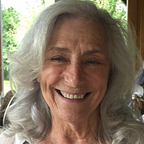Official Oscar® Submission for Best Foreign Language Film from Georgia: ‘Scary Mother’
Scary is not exactly the word for this horror of a woman. Expecting something like a Japanese horror film, I was taken by surprise to learn that the scary part of this mother was her imagination. And to realize further that our imagination is shaped by the traumas of our childhood as ways of coping impacts powerfully on the psyche of whoever is watching it.
What begins as a happy family whose mother has taken time to write ends with the discovery that one’s imagination is more than mere images conjured up by a creative mind. Scary Mother develops this thesis into
A 50-year-old housewife struggles with her dilemma — to choose between her family life and her passion, writing, which she had repressed for years — and decides to follow her passion thus plunging herself into writing, sacrificing to it mentally and physically.
It takes a brave woman to depict the hidden recesses of passion and Ana Urushadze, 27, is making quite an impression on the international festival circuit with her first feature Scary Mother. Winner of Best Feature at Sarajevo and of the Cineuropa Prize and in Locarno, winner for Best First Feature and the Youth Jury Award, the film is establishing the credentials of Urushadze worldwide.
A graduate of Georgia’s Shota Rustaveli Theatre and Film University, Urushadze is the daughter of acclaimed Georgian helmer Zaza Urushadze whose feature Tangerines was shortlisted for an Oscar in 2013. She spoke to Variety at the Antalya Film Festival about her creative process and the intense collaboration with actor Nato Murvanidze who puts in a powerful performance.
As for the feminist aspect, at first I didn’t even think about it….In fact when I started out I was going to write this story with a male protagonist, it would have been a husband leaving his family to write a book. Then it become more interesting and intense and significant for me to have it be about a woman, and at that point it also became more serious and more about female empowerment.
Was it difficult to write the parts of the protagonist’s book which are read out loud in the film?
Actually my younger sister, who is a writer, wrote those parts. I asked her and she wrote them in, like, half an hour.
Scary Mother is driven by Nato Murvanidze who puts in a tour-de-force performance that reminded me of Isabelle Huppert. Can you tell me about how you found her and how the two of you worked together?
It’s funny, she and I were talking about Isabelle Huppert yesterday. She is a big fan, as am I. Nato is very well known in Georgia and we’ve been friends for a while. Her method is she loves to talk about the character. So we explored the character in depth before shooting and also during the shoot. But she never asked to see any rushes. She didn’t want to see what Manana looked like onscreen until the film was completed.
“With years of domestic duty weighing heavily on her shoulders in a drab Tbilisi apartment block, Manana (Nato Murvanidze) is quietly going crazy,” The Hollywood Reporter says of Scary Mother’s plot. “Her only escape is to work on a darkly erotic thriller, the contents of which she keeps from her somewhat contemptuous husband, Anri (Dimitri Tatishvili). When Manana lets Anri read an excerpt from her book, his latent fears that his wife is slipping from the comfort zone in which he keeps her explode.”
A dark tale of female liberation, this is the second time Georgia has submitted a female-directed film to the Academy. The country previously selected two films directed by Nana Jorjadze, A Chef in Love and 27 Missing Kisses, and one she co-directed, In Bloom.
What does this say about Georgia situated in the Caucasus region of Eurasia, at the crossroads of Western Asia and Eastern Europe, bounded to the west by the Black Sea, to the north by Russia, to the south by Turkey and Armenia, and to the southeast by Azerbaijan? This mythical land of the Golden Fleece reached the peak of its political and economic strength as a unified Kingdom of Georgia during the reign of King David IV and his granddaughter Queen Tamar in the 12th and early 13th centuries. The 29-year reign of Tamar, the first female ruler of Georgia, is considered the most successful in Georgian history. Tamar was given the title “king of kings” (mepe mepeta). She succeeded in neutralizing opposition and embarked on an energetic foreign policy aided by the downfall of the rival powers of the Seljuks and Byzantium. Supported by a powerful military élite, Tamar was able to build on the successes of her predecessors to consolidate an empire which dominated the Caucasus, and extended over large parts of present-day Azerbaijan, Armenia, and eastern Turkey as well as parts of northern Iran, until its collapse under the Mongol attacks within two decades after Tamar’s death in 1213. Thereafter, the kingdom declined and eventually disintegrated under hegemony of various regional powers, including the Mongols, the Ottoman Empire, and successive dynasties of Iran.
Of 92 films vying for a nomination for Best Foreign Language Film, 25 are directed or co-directed by women — an encouraging 27 percent.
